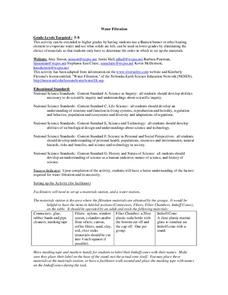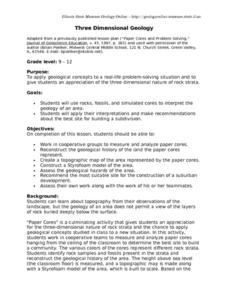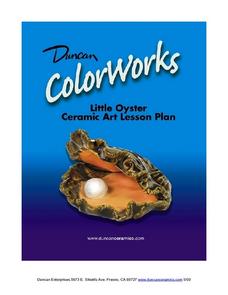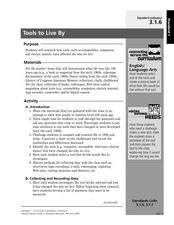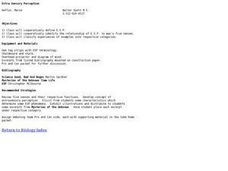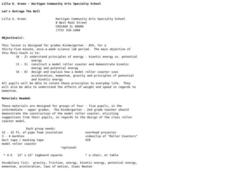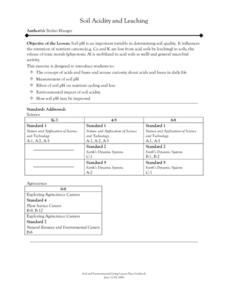Curated OER
Water Filtration
Students investigate our water system and how it is filtered. In this science lesson, students perform a laboratory activity to investigate the process that goes into filtering water. They relate this activity to other subject areas...
Curated OER
Organize Ocean Animal Research
Sixth graders research a variety of ocean animals, organizing the facts in the form of a database. They input the results of the research into the appropriate field of their database for their Oceanography Science Unit.
Curated OER
Sea World Fieldtrip Follow-up
Students create a graphic organizer in preparation for a web page about a specific science-related topic. This lesson is used as a follow-up to a field trip experience and can be adapted for many different subjects.
Curated OER
Investigating Brass Instruments and Pitch
Students observe the sounds of different brass instruments in order to understand how to create different pitches. In this musical instructional activity, students create a "brass" instrument from everyday household objects. The students...
Virginia Department of Education
Prokaryotes
Lead your biology class on a cell-sized adventure! Emerging scientists construct models of prokaryotes, then design an experiment to properly grow a bacterial culture. They conclude the activity by viewing the culture under a microscope....
Curated OER
Three Dimensional Geology
Here is a fine lesson plan on geology designed for high schoolers. Learners use rocks, fossils, and other geological clues to determine the geology of an area. Then, they make recommendations to a fictitious city council about the...
Curated OER
Little Oyster: Ceramic Lesson
Children will love researching and then creating a bottom dwelling mollusk of their own. They watch clips describing the ocean ecosystem and how oysters fit into their environment. Next, they research what oysters eat and how they look....
Curated OER
Red Wigglers
Students are introduced to the benefits of using Red Wiggler worms to produce compost. They identify the requirements for the worms and the methods to follow in order to produce compost. They draw a picture of a functioning worm bin.
Curated OER
The "Coal LIfecycle" Scrapbook
Students discover how coal is formed. In this science lesson, students create a scrapbook on the life cycle of coal and show how coal is formed by showing pictures of each stage.
Curated OER
Web of Life
Students work together to create a web of life. In groups, they put on nametags and form a circle. They toss the ball to a random person in the group and they make a connection between the person throwing the ball and the person...
Curated OER
Tools to Live By
Third graders compare life in the early 1900's with the life today. In this technology lesson, 3rd graders research about the development of a certain technological tool. They collect data and report findings in class.
Curated OER
POLLINATION DEMONSTRATION
Third graders study the terms pollen and pollination. They use appropriate vocabulary in describing their investigations, explorations, and observations (e.g., stem, pistil, stamen, flower). They describe, using their observations,...
Curated OER
Salmon Scavenger Hunt
Students go on a salmon scavenger hunt to find out about threats to salmon populations. They gather information about some of the reasons wild salmon have gone from such incredible abundance to relative scarcity, and about some of the...
Curated OER
Extra Sensory Perception
Middle schoolers define extra sensory perception. In this science lesson plan, students identify the relationship of E.S.P. to man's five senses and classify experiences of examples into respective categories.
Curated OER
Let's Outrage the Bull
Students study kinetic and potential energy. In this energy lesson, students in grades K-2 understand the differences between kinetic and potential energy. Students in grades 3-5 demonstrate that kinetic and potential energy. Students in...
Curated OER
Forest In A Jar
Tenth graders are introduced to the process of succession and gain awareness of the changing nature of ecosystems. They demonstrate a comprehension of the dynamic nature of ecosystems, including the relationship between ecological...
Curated OER
Soil Acidity and Leaching
Students are introduced to the concept of acids and bases and arouse curiosity about acids and bases in daily life. They are introduced to the measurement of soil pH. Pupils are introduced to the effect of soil pH on nutrient cycling...
Curated OER
What Is It?
Play the game of Tag and differentiate between plants and animals. Explore the characteristics of plants. Identify the major parts of plants (e.g., seeds, stem, pistil) and describe their basic functions. Compare the requirements of some...
Curated OER
Terrariums: A Look at the Living and Nonliving World
Third graders examine life in a terrarium and relate it to life in a larger environment. In this terrarium lesson, 3rd graders examine how living and non-living things work together by examining the changes in a terrarium. They make...
Curated OER
Journey To the Unkown
Learners explore the ocean rift habitat off the Galapagos through an audio expedition, Internet research on deep sea animals, an explorer game and simulation of the exploration of the deep sea bottom. They focus on the actual NOAA...
Curated OER
Round and Round-The Water Cycle
Students explore the water cycle. In this earth science activity, students work in small groups to read various books on the water cycle and take notes on chart paper. Students share their notes and teach a younger audience what they...
Curated OER
Introduction to Ocean Grazers
Students explore biology by creating a poster with classmates. In this oceanography instructional activity, students identify the importance of coral reefs to the ocean's ecology and examine a food web of ocean animals. Students define a...
Curated OER
An Emerald Place
Students discover four layers of the rain forest and identify the life of animals at each level.
Curated OER
Postcards From Mars
Fifth graders research and explore what life would be like for human colonists on Mars. They explore various websites, read and discuss newspaper articles, develop a chart of the hardships and conditions that would be faced by colonists...
